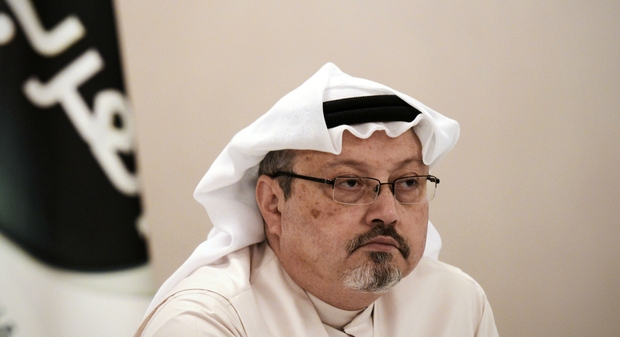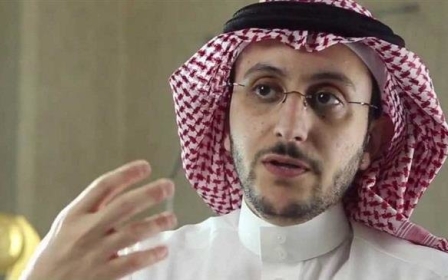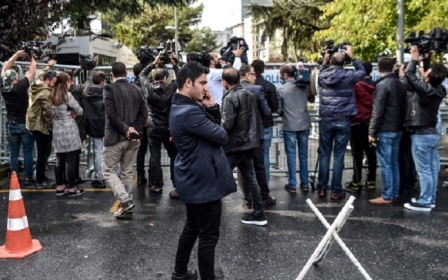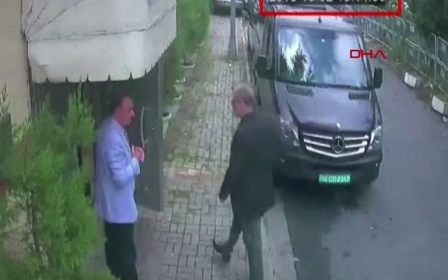Middle East leaders back Saudi Arabia after Jamal Khashoggi's disappearance

A week after Saudi journalist Jamal Khashoggi vanished on 2 October after entering the Saudi consulate in Istanbul, the reaction among Arab leaders was consistent: silence.
Within days of his disappearance, Turkish officials - anonymously and without releasing evidence - told reporters that they were certain the veteran journalist was killed inside the building.
Saudi officials, meanwhile, have strongly denied any involvement in his disappearance and say that he left the consulate soon after he arrived - but have also not presented any evidence to corroborate their claim.
Last week, as Turkish officials continued to leak gruesome, uncorroborated details to the media, tens of corporate executives and media outlets pulled out of the kingdom's "Davos in the Desert" investment conference.
On Sunday, Britain, France and Germany issued a joint statement letting the kingdom know they were treating Khashoggi's case with "the utmost seriousness". During a 60 Minutes interviewed also aired on Sunday, US President Donald Trump vowed "severe punishment" if Saudi Arabia was behind his disappearance.
However, reaction among Arab leaders - with most responding for the first time on Sunday as Saudi officials responded to Trump's comments - has been largely supportive of Saudi Arabia and critical of media outlets reporting the Turkish leaks, with some characterising the reports as a coordinated campaign against the kingdom.
Here's what they've said:
United Arab Emirates
Last Thursday, in one of the earliest statements of support, the UAE's Minister of State for Foreign Affairs Anwar Gargash tweeted:
Translation: The fierce campaign against Riyadh is expected as is the coordination between its inciting parties, and as there is a need to show the reality of the humanitarian dimension of things, the repercussions of the political targeting of Saudi Arabia will be dire for those who fuel it. It remains that the success of Saudi Arabia is what the region and its people want.
His comments were followed a day later by Emirati Foreign Minister Sheikh Abdullah bin Zayed al-Nahyan, who tweeted that his country always stands by Saudi Arabia "because it is a stand with honour, glory, stability and hope".
Palestine
On Sunday, Palestinian President Mahmoud Abbas said he offered his "full confidence" to the kingdom and thanked its leaders for their support of the Palestinians.
"Palestine was - and shall remain - on the side of Saudi Arabia," Abbas said in a statement.
Palestinian sources told the Jerusalem Post they believed that the statement was issued at the request of the Saudi leadership.
Lebanon
Lebanese Minister Saad Hariri said in a statement also on Sunday that he stood in solidarity with Saudi Arabia "in the face of the campaigns targeting it".
"The status of Saudi Arabia in the Arab and international communities places it among the central countries entrusted with the stability of the region and the support of the Arab causes," he said.
“The campaigns against it constitute a violation of this stability and an unacceptable call to drag the region towards further negative developments."
Last November, Hariri announced in a televised address from Riyadh that he was stepping down as prime minister of Lebanon, sparking concerns that he was being detained against his will.
After France intervened, Hariri was freed and rescinded his resignation the following month. He was named premier for a third term earlier this year after Lebanon's first parliamentary polls in nine years.
Egypt
Ahmed Hafidh, Egypt's foreign ministry spokesman, said on Sunday that the country was following the repercussions of Khashoggi's disappearance with great "concern" and warned against using his case politically against Saudi Arabia.
“Egypt reaffirms its support for the kingdom in its efforts and positions dealing with this event," he said.
Bahrain
Bahrain’s foreign ministry released a statement on Sunday emphasising the country’s support for Saudi Arabia in the face of those trying to harm the kingdom.
Saudi Arabia is “the essential foundation for the security and stability of the Arab and Islamic worlds and the solid foundation and strong pillar of stability in the region,” the statement said, adding that Bahrain “rejects” the attempts to infringe on the “sovereignty, policies and prestige” of the kingdom.
Yemen
Yemen's president Abd Rabbuh Mansour Hadi - who has been living in exile in Riyadh since 2015, after the Houthi movement captured significant territory in the country - affirmed its "full solidarity" with the kingdom.
"The cheap political and media targeting of Saudi Arabia will not deter it from continuing its leading role in the Arab and Islamic worlds," the president said in a statement reported in Saudi media.
Arab League
The Arab League affirmed on Sunday its rejection of any political pressure applied on Saudi Arabia in relation to the Khashoggi affair.
"It is totally unacceptable, in the context of relations between countries, to wave economic sanctions as a policy or tool to achieve political goals," an Arab League official told Wafa agency.
"Concerning the disappearance of the Saudi journalist Jamal Khashoggi, Saudi authorities have clearly stated their cooperation in ongoing investigations."
Iran
Saudi arch-rival Iran said on Monday it would adopt a wait-and-see approach to Khashoggi's disappearance.
"We prefer to wait until more details and facts are revealed ... It is too early to comment," Foreign Ministry spokesman Bahram Qasemi told a news conference, broadcast live on state TV.
Stay informed with MEE's newsletters
Sign up to get the latest alerts, insights and analysis, starting with Turkey Unpacked
Middle East Eye delivers independent and unrivalled coverage and analysis of the Middle East, North Africa and beyond. To learn more about republishing this content and the associated fees, please fill out this form. More about MEE can be found here.




